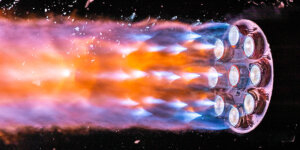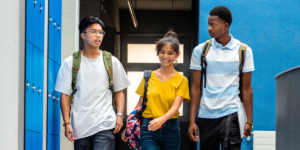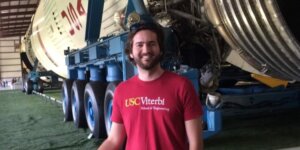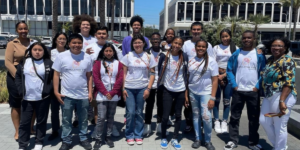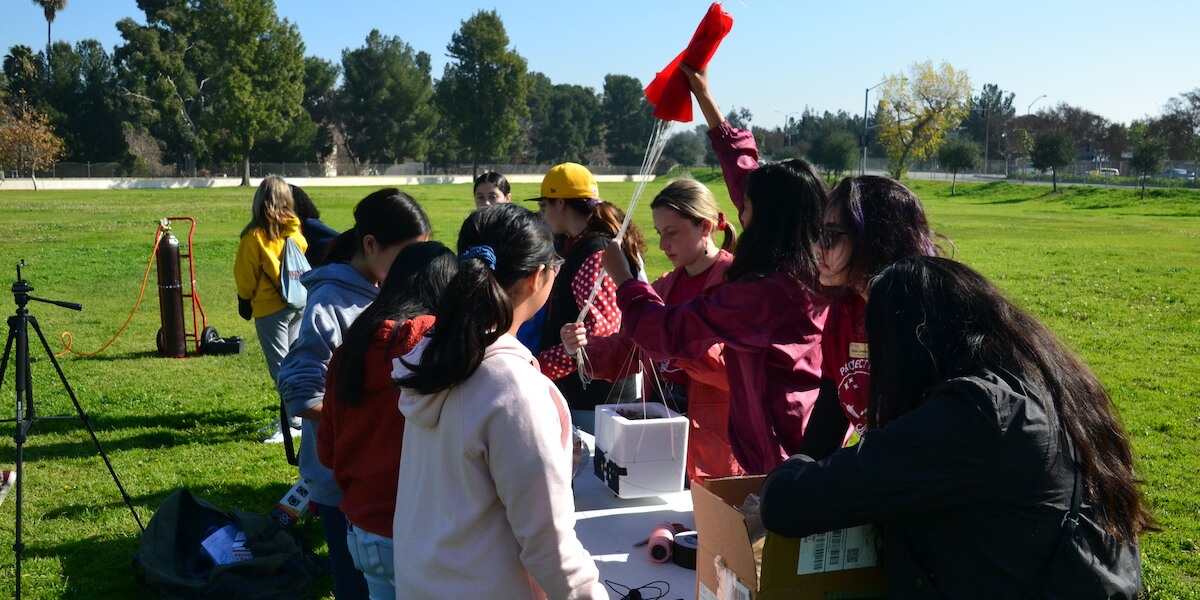
Students from the Project Payload 2019 cohort preparing the high-altitude balloon for launch. (Image Courtesy of USC Viterbi K-12 STEM Center)
For years, careers in STEM fields have been largely dominated by men, and although efforts to close this gender gap have led to progress, women still remain largely underrepresented in engineering professions.
This disparity is particularly stark in the aerospace industry: as of 2021, just 12.5% of all aerospace engineers in the United States were women.
The Project Payload program, launching this summer at the USC Viterbi School of Engineering, seeks to address this gap by offering middle school girls a hands-on, problem-based learning experience in the fields of aerospace engineering and computer science. The program ran once before, in 2019, and will return this July thanks to the generous gift of Jordan Noone (B.S. AE ’14), and Jenna Bryant, co-founders of venture capital fund, Embedded Ventures.
“We’re really excited to be able to support a program like Project Payload that offers students a hands-on learning opportunity at such a young age,” said Noone, who, as a USC Viterbi student, led the USC Rocket Propulsion Laboratory. “We hope that it inspires and encourages young girls to stay on this STEM path.”
Over the course of this summer’s two-week program, 15 girls entering sixth through eighth grades will spend their days learning coding and programming skills and gaining exposure to the foundations of aerodynamics and rocket design through daily activities, lessons, demonstrations, and hands-on projects. The program will culminate with the launch of a high-altitude balloon at STARBASE in Los Alamitos.
“In addition to working towards rocket launch, we want the girls who participate in this program to learn that STEM is for them,” said Anne Areta, a program coordinator at USC Viterbi’s K-12 STEM Center, who’ll be managing this summer’s session of Project Payload.
To help run the camp, Areta has hired Cathalina Juarez, a STEM education specialist currently working with NASA as a Solar System Ambassador, who has worked on education projects at USC Viterbi in the past. Areta also plans to hire a USC Viterbi graduate student, who will work with Juarez to create lessons for the program and oversee the daily operations of the camp.
Additionally, Project Payload campers will receive mentorship from high school students participating in a different K-12 STEM Center program: USC Viterbi’s Summer High School Intensive in Next-Generation Engineering, or SHINE. SHINE gives high school students the opportunity to join the engineering research team of a USC faculty member, allowing them to actively contribute to cutting-edge research in a real-world setting. SHINE students working in aerospace engineering labs will offer Project Payload campers advice, help them with group projects, and share the work they’re doing in USC Viterbi research labs.
“We hope that bringing in SHINE students to share their insights and how they persevere through their challenges will help keep our girls in Project Payload encouraged and motivated to complete the task at hand – getting this balloon 30,000 feet in the air,” Areta said.
“We are really grateful for Jordan and Jenna’s gift to the program,” Areta added. “Without their support, we would not be running Project Payload this year, and we are thankful that they decided to invest in the program to support the advancement of underrepresented girls in STEM.”

Noone and Bryant currently serve as general partners at Embedded Ventures, an early-stage venture capital fund that they co-founded in 2020. (Image Courtesy of Bradford Rogne)
According to Noone and Bryant, they are honored to support a program that affords STEM opportunities for girls at an early stage in their education.
During his time at USC, Noone was an active member of USC Viterbi’s Rocket Propulsion Laboratory, a premier student-run research group that, later, in 2019 became the first student group to send a rocket to space. While leading RPL, Noone became the first student in the world to obtain an FAA launch license to fly a rocket to space.
“I saw firsthand how insanely valuable it is for students to experience engineering in a really authentic and hands-on way from my own experiences in the Rocket Propulsion Lab, which I credit for setting a strong foundation that contributed to shaping and guiding much of my early professional career,” Noone said.
“We’re hoping that this project reaches young women at an age where they might not know yet what they want to be when they grow up, at an age where they might not have a full vision of what it looks like to pursue a career in tech, and when they might not be sure yet if they belong,” said Bryant, who also serves as the CEO of Embedded Ventures. “Hopefully, some of these girls might find they are truly passionate about pursuing a career in STEM, and we hope an opportunity like this encourages these students to lean in, stay engaged, and become even more excited.”
Published on April 5th, 2022
Last updated on April 5th, 2022




